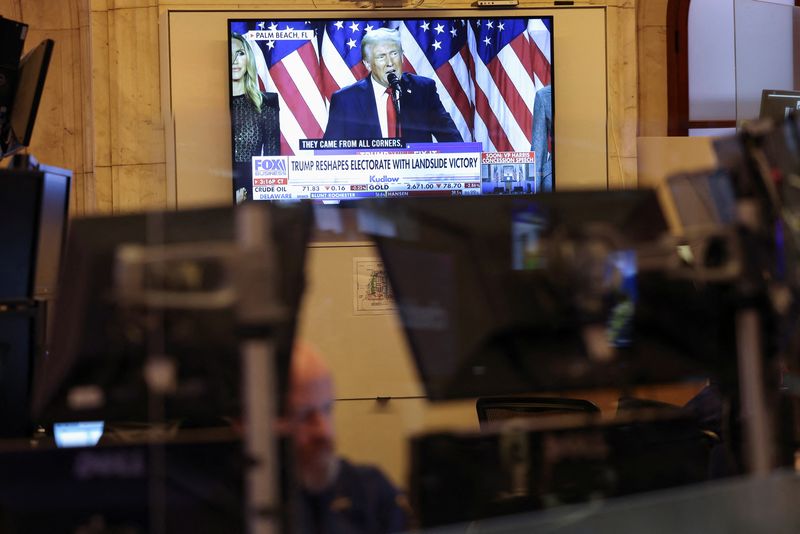By Lewis (JO:LEWJ) Krauskopf
NEW YORK (Reuters) - A U.S. stock rally fueled by Donald Trump’s election victory is stumbling, as investors contend with everything from renewed inflation worries to uncertainty over the impact of the president-elect's policies.
The S&P 500 fell 2% in the past week, erasing more than half its gains from a post-election surge fueled in part by optimism over the pro-growth policies that are a key part of Trump’s economic platform.
Though the index remains near record highs and is up 23% this year, some of that enthusiasm has been tempered in recent days.
Bets that some of Trump’s policies could spur a rebound in inflation and cloud the picture for further interest rate cuts helped push the benchmark U.S. 10-year yield to its highest level in more than five months on Friday, a potentially unwelcome development for stocks.
Worries over Trump’s cabinet selections and plans for cutting bureaucratic excess have bruised the shares of pharmaceutical companies and government contractors. Meanwhile, Wall Street has little clarity on when, and to what extent, the president-elect will implement his agenda.
While the market had rushed to price in the positive outcomes from Trump’s economic policies, “I'm skeptical that it's going to be that easy,” said Paul Nolte, senior wealth adviser and market strategist at Murphy & Sylvest Wealth Management.
A Trump spokesperson did not immediately respond to a request for comment.
Trump has previously said that his trade policies - which call for pricey tariffs on goods not only from rivals such as China but allies such as the European Union - would revitalize American manufacturing and yield enough revenue to ease concerns about ballooning the deficit or increasing inflation.
EYES ON YIELDS
Rising yields are one of the market’s chief concerns, because they offer investment competition for equities while raising the cost of capital for companies and consumers.
The benchmark 10-year yield - which typically moves with interest rate expectations - has surged about 90 basis points since mid-September as investors curtailed bets on how deeply the Federal Reserve will cut borrowing costs in the face of robust growth that could stoke an inflationary rebound.
Until recently, stocks may have been able to shrug off the rise in yields because it had been driven by stronger-than-expected economic data. But many of Trump’s policies - from tax cuts to tariffs - are seen as inflationary, and could keep yields climbing past the 4.5% level that some investors have flagged as a potential trigger for stock market unease.
The yield touched 4.5% on Friday before settling lower.
"If yields continue to trend up and they don't find their ceiling, I think it will become a problem because it will basically translate into a tighter monetary environment," said Irene Tunkel, chief U.S. equity strategist at BCA Research.
Fed Chair Jerome Powell on Thursday said there was little need for policymakers to rush to cut rates, given solid economic growth and inflation above the central bank’s 2% target. The comments weighed on stocks and pushed bond yields higher.
As yields have risen, the relative attractiveness of equities compared with U.S. government bonds, which are seen as risk-free if held to term, has dimmed by some measures.
The equity risk premium, which compares the S&P 500 earnings yield against the 10-year Treasury yield, is at its lowest level since mid-2002, said Keith Lerner, co-chief investment officer at Truist Advisory Services.
POLICY UNCERTAINTY
Uncertainty over the timing and ultimate impact of Trump’s policies has also grown.
Shares of Pfizer (NYSE:PFE), Moderna (NASDAQ:MRNA) and other drugmakers fell at the end of last week after Trump picked vaccine skeptic Robert F. Kennedy Jr. to lead the Department of Health and Human Services.
Defense and government contractor stocks including Leidos Holdings (NYSE:LDOS) and General Dynamics (NYSE:GD) also fell, as investors fretted about the fallout from a new government efficiency entity led by Tesla (NASDAQ:TSLA) CEO Elon Musk.
Kennedy, a cabinet pick, still has to be confirmed by Senate lawmakers, while the extent of any spending cuts stemming from the efficiency entity is unclear.
Nevertheless, the uncertainty has pushed some investors to "sell first, ask questions later," said King Lip, chief strategist at BakerAvenue Wealth Management.
Meanwhile, strategists at BofA Global Research said the risks to their forecast of 2.3% economic growth next year were “very large in either direction” given the lack of clarity over which aspects of Trump’s policies will be prioritized.
Growth could shoot above 3% if the administration focused on fiscal easing and deregulation, the bank’s strategists wrote on Friday. But a hard pivot to tariffs could spark a trade war and eventually pull the economy into a recession, they said.
Of course, some so-called Trump trades are still sporting huge gains. Shares of Tesla, which have risen on bets that Musk’s close association with the president-elect will benefit the company, are up 28% since Election Day.
Bitcoin, lifted by hopes of crypto deregulation, was up over 30% as of late Friday.
At the same time, stocks have tended to perform well at year-end, with the S&P 500 up an average of 3.3% in the last two months of presidential election years since 1952, according to Truist’s Lerner.

That is cause for continued optimism, along with strong corporate earnings and a healthy growth backdrop, said Ross Mayfield, investment strategist at Baird Private Wealth Management.
"There is a lot else working for the market," Mayfield said.